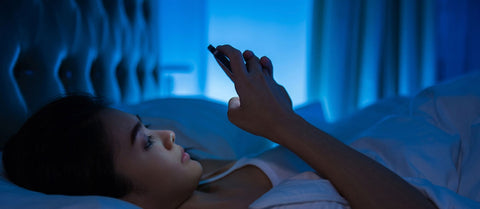
Despite pushback from low-tech purists, most of our realities involve having to depend on gadgets for work and communication. At some point throughout the day, chances are that you have to pick up a phone, turn on your laptop, or use your tablet. If you’re like most of us, you do so practically every ten minutes!
Even those without desk jobs that require them to be in front of a screen for hours on end eventually use gadgets. We can’t deny that technology offers many incredible benefits, but it’s easy to forget the damage that it can do.
Many of us are already aware of the dangers of text neck, but excess gadget usage can do much more to cause harm. One that you should be aware of is blue light. Those seemingly harmless blue rays coming from your computer screen or smartphone can damage your eyes, resulting in long-term issues.
As blue light awareness rose, people began to look for filters that could be installed on their glasses or computer screens. After all, it was beginning to affect users’ natural biological clocks along with their eyes.
On top of the given disadvantages, new studies are now showing that prolonged exposure to blue light can cause one to age faster. Here’s how:
 1. It disturbs your sleeping schedule
1. It disturbs your sleeping scheduleProlonged exposure to blue light, such as what your phone screen emits, is known to suppress the production of melatonin. Melatonin is the hormone that your body needs to regulate your circadian rhythms. Without it, your body will find it hard to rest. The lack of sleep will cause your body to age faster since it will prevent your body from restoring and regenerating healthy cells during sleep. Wearing anti blue light glasses can help with this but what about the blue light on your skin?!
 2. It has the potential to destroy your eye cells and brain cells
2. It has the potential to destroy your eye cells and brain cellsResearch that involved flies has found that those exposed to blue light had a shorter life span - whereas flies that were in the dark lived longer. In this study, flies were exposed to blue LED light for 12 hours. Scientists found that the flies eventually stopped moving around within their enclosure. The study later found that this phenomenon was due to the light damaging the brain and eye cells of the flies. When the different wavelengths and colours used for the study were compared, it became clear that blue light had the most harmful effects.
 3. It increases your stress levels
3. It increases your stress levelsIn the same study, experts found that blue light destroys the cells that regulate your stress levels. While the fruit flies were exposed to blue light for 12 hours, stress levels were at an all-time high. Although the study could not conclusively say that flies respond just as humans do, their cells are quite similar. Since blue light damages the cells in fruit flies, we have to assume that it does the same to humans. The more stressed you are, the more energy you spend. This, in turn, weakens your body and makes you more vulnerable to illnesses.
The effects of blue light are truly detrimental to the human body. The concerning results of this study make it clear that we may even have to worry about a decreased lifespan. Take note that the blue light used during the studies is similar to the light emitted by your gadget’s screens. Whether you spend hours on your laptop, mobile phone, or iPad, it’s wise to limit your screen time.
If you do have to spend hours a day in front of a screen, try turning down the brightness of the gadget’s screens. Protect your eyes even further by installing a blue-light-blocking screen protector or amber glasses. By securing your screen with anti-blue light protection, you can save yourself from the risk of ageing faster due to blue light.

How we reviewed this article:
Ocushield has strict sourcing guidelines and relies on peer-reviewed studies, academic research institutions, and medical associations.
Our experts continually monitor the health and wellness space, and we update our articles when new information becomes available.
Current Version
September 30, 2020

Leave a comment